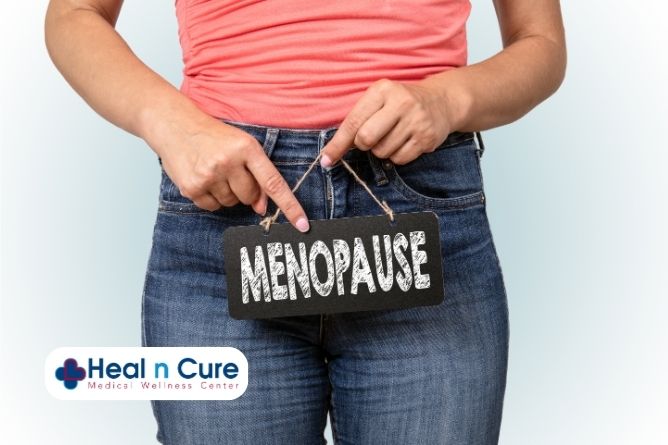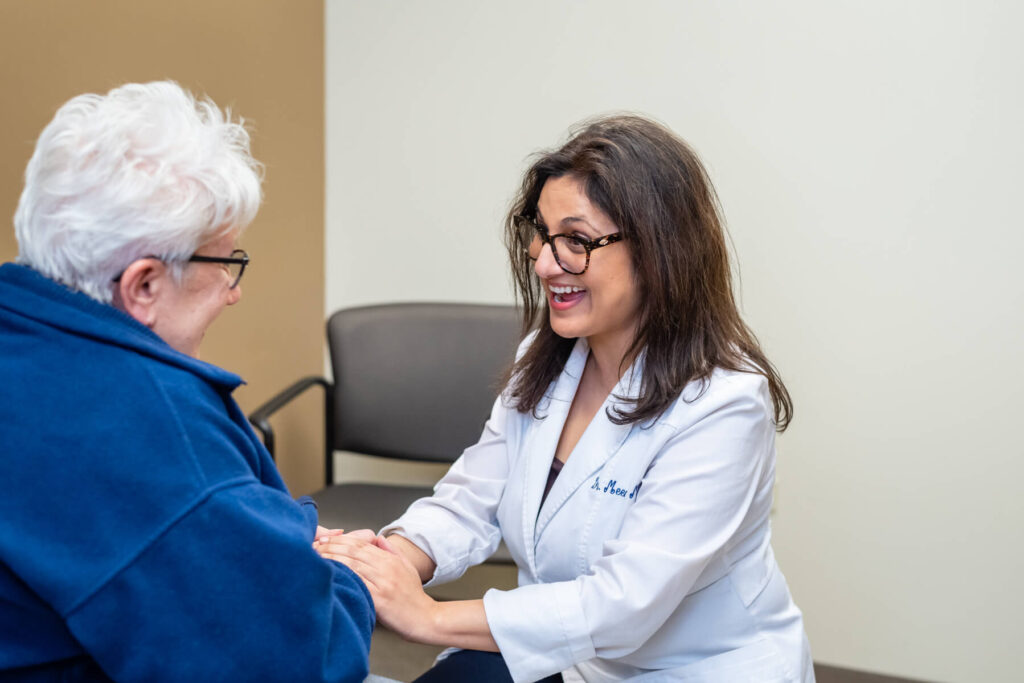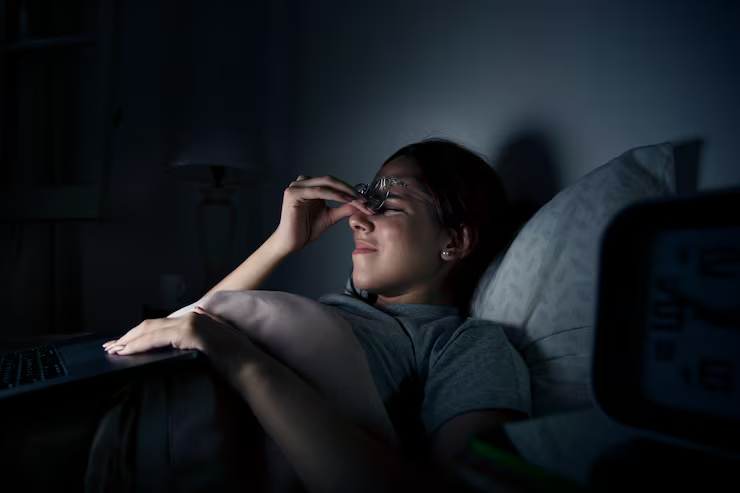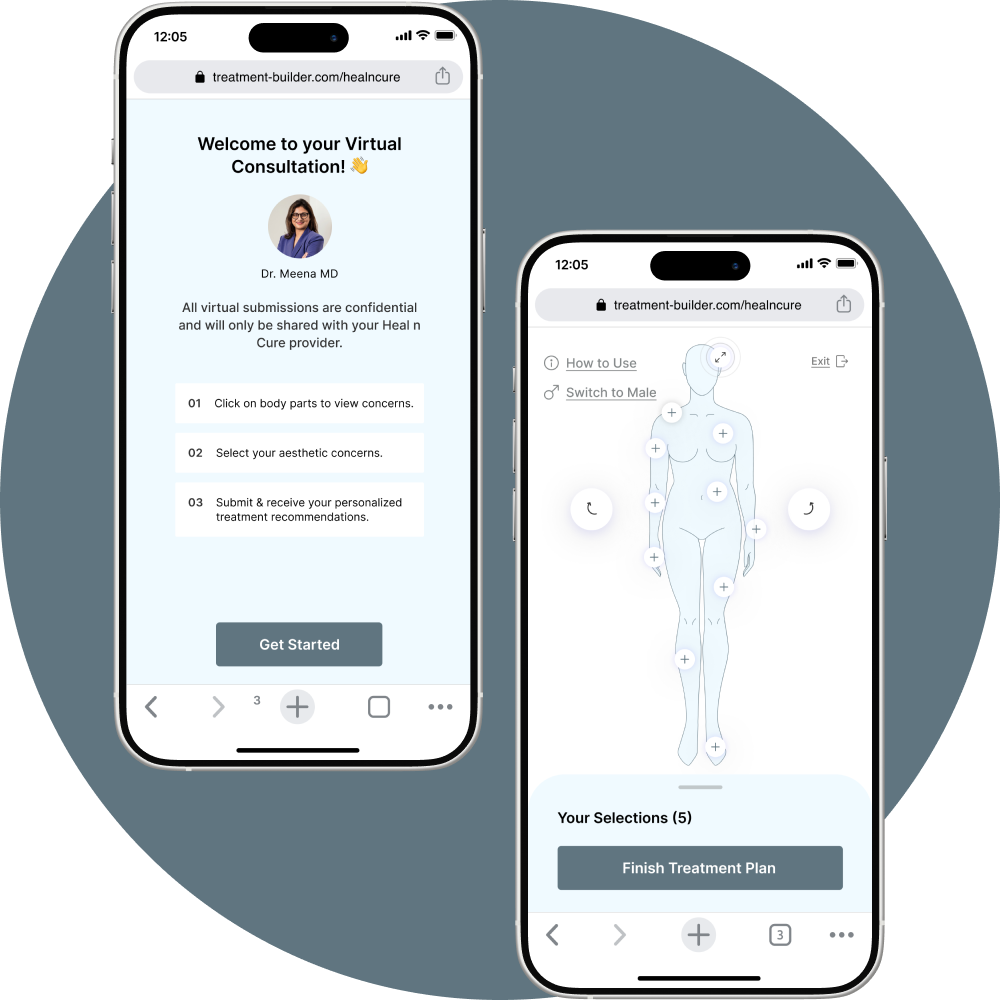
Sexual Health After Menopause - Heal n Cure Medical Wellness Center
Menopause signifies the end of menstrual cycles and is a natural transition when our ovaries stop producing estrogen. During this period, many women experience various symptoms like hot flashes and mood changes.
The hormonal shifts can also affect our sexual health.
We might encounter issues such as vaginal dryness, painful intercourse, and low libido after menopause. All of these symptoms combined are called Genitourinary Syndrome of Menopause. These changes are quite common but can feel distressing. While these challenges come naturally with aging, there are ways to enhance intimacy and maintain sexual well-being.
This article will look into effective solutions to improve sexual health post-menopause. Stay with us for helpful tips!
Key Takeaways
- Vaginal dryness, painful intercourse, and low libido are part of Genitourinary Syndrome of Menopause due to decreased estrogen and testosterone levels.
- Hormonal treatments like Bioidentical Hormone Replacement Therapy (BHRT) can restore hormone levels, improving sexual health.
- Non-hormonal options such as water-based lubricants, vaginal moisturizers, and lifestyle changes also help reduce symptoms.
- Regular exercise, a healthy diet, adequate sleep, stress management, and open communication with partners enhance post-menopause intimacy naturally.
- Heal n Cure offers personalized BHRT plans along with holistic approaches to support women in reclaiming their sexual health after menopause.
Common Sexual Health Issues After Menopause
Menopause brings about many changes in a woman’s body, especially regarding sexual health. As estrogen and testosterone levels drop, women may experience issues such as vaginal dryness, painful intercourse, and low libido.
Vaginal Dryness
Vaginal dryness occurs because our estrogen levels drop after menopause. Estrogen keeps the vaginal lining thick, moist, and elastic. Without enough of this hormone, the lining thins and becomes dry.
This can lead to discomfort during intercourse.
Over one-third of women in perimenopause or menopause experience vaginal dryness. We may also notice less natural lubrication, making sex painful. Water-based lubricants and over-the-counter moisturizers can help relieve these symptoms.
Increasing blood flow to the genitals through exercise may improve sensitivity and arousal as well.
Low Libido After Menopause
Low libido after menopause can be frustrating. Decreased estrogen and testosterone levels often impact our sexual desire. According to data, about 40-55% of us report low sexual desire during menopause.
Aging also reduces blood flow to the genitals, which decreases sensitivity.
We may feel less interested in sex due to emotional changes too. Anxiety and depression are common during this stage, causing further reduction in libido. Hormone replacement therapy (HRT) may help but carries health risks that we need to consider carefully.
Painful Intercourse
Painful intercourse, also known as dyspareunia, can happen after menopause. This pain often results from vaginal dryness and thinning of the vaginal walls. These changes reduce natural lubrication, making sex uncomfortable or painful.
To address this issue, we have several options. Non-hormonal treatments like water-based lubricants and vaginal moisturizers offer immediate relief. Hormonal treatments including estrogen creams or rings can help restore vaginal health over time.
Two FDA-approved non-hormonal medications, Ospemifene and Prasterone, are also available for severe cases of dyspareunia.
Hormonal Treatments for Intimacy After Menopause
Bioidentical hormone replacement therapy (BHRT) can improve sexual health after menopause by restoring estrogen and testosterone levels. At Heal n Cure Medical Wellness Center, we offer personalized hormone therapy plans to address each woman’s specific needs.
Estrogen Therapy for Vaginal Health
Local estrogen treatments work wonders for vaginal health. These therapies target symptoms like vaginal dryness, itching, and burning. They improve the maturation of the vaginal tissues by increasing estrogen levels directly in that area.
This helps make intercourse more comfortable.
Topical and systemic estrogen therapy both play key roles in enhancing muscle tone and reducing vaginal pH. Estrogen promotes the growth of beneficial Lactobacillus, which supports a healthy environment in the vagina.
The FDA has approved Intrarosa (vaginal DHEA) to treat painful intercourse specifically related to low estrogen levels after menopause.
Testosterone Therapy for Libido Improvement
Testosterone therapy may help treat hypoactive sexual-desire disorder (HSDD) in postmenopausal women. A 2008 study showed that women receiving 300 µg of testosterone reported a significant increase in sexually satisfying events.
Adverse effects included application-site reactions and increased hair growth, but these were generally mild. The FDA has not approved testosterone for HSDD in the US.
We often combine testosterone with estrogen to optimize sexual health outcomes. This combination can significantly enhance libido and improve overall well-being after menopause. Current treatment options are still limited, making hormonal treatments a valuable option for those struggling with low libido post-menopause.
Non-Hormonal Solutions for Post-Menopause Sexual Health
Non-hormonal treatments benefit those who cannot or prefer not to use hormone therapy. These methods can alleviate symptoms such as vaginal dryness but may not address the hormonal cause of low libido fully.
Vaginal Moisturizers and Lubricants
Vaginal moisturizers and lubricants can greatly enhance sexual health after menopause. These products help reduce friction and discomfort during intercourse, providing immediate relief from vaginal dryness.
- Vaginal Moisturizers:
- Products like K-Y Liquibeads and Replens are designed for daily or frequent use.
- They help maintain vaginal tissue health by keeping the area hydrated.
- Regular use can alleviate symptoms of vaginal dryness.
- Vaginal Lubricants:
- Use Astroglide or Sliquid before sexual activity to reduce friction.
- These lubricants provide immediate comfort, making intercourse less painful.
- They come in various forms including gels, liquids, and silicone-based options.
- Frequency of Use:
- Apply vaginal moisturizers regularly as part of your routine.
- Use lubricants just before engaging in sexual activities for best results
- Benefits:
- Helps maintain a healthy vaginal environment.
- Reduces pain during intercourse, making it more enjoyable.
- Non-Hormonal Options:
- These products offer relief without the need for hormonal treatments.
- Ideal for women who prefer or need to avoid hormone therapy.
Morpheus V and Forma V
Radiofrequency (RF) delivered through Morpheus V and Forma V stimulates the fibroblasts to produce more collagen and elastin which restores the health of vaginal tissue. Think about it like a facial for your vagina. These modalities are life changing for women who dont want or can not take BHRT.
Using these solutions can make a significant difference in postmenopausal intimacy challenges. Keep exploring what works best for you and consult with your healthcare provider for personalized advice.
Lifestyle Changes to Boost Sexual Health
Transitioning from vaginal moisturizers and lubricants, let’s focus on lifestyle changes to boost sexual health. Making simple adjustments in daily habits can make a big difference.
- Engage in Regular Physical Activity
Exercise boosts blood flow and energy levels. Activities like walking, yoga, or swimming can enhance sexual response and overall well-being. Aim for at least 30 minutes of exercise most days of the week to support sexual health.
- Eat a Healthy Diet
A balanced diet helps maintain a healthy weight and supports libido. Include fruits, vegetables, whole grains, and lean proteins in your meals. Foods rich in omega-3 fatty acids, like salmon, can improve mood and energy levels.
- Get Enough Sleep
Adequate sleep is crucial for maintaining hormonal balance and reducing stress. Strive for 7-9 hours of quality sleep each night to feel more energized and improve intimacy.
- Manage Stress with Relaxation Techniques
Stress negatively impacts sexual desire. Practices such as meditation, deep breathing exercises, or yoga can help manage stress levels effectively. These techniques promote relaxation and enhance libido.
- Stay Hydrated
Drinking enough water keeps the body hydrated and helps prevent vaginal dryness after menopause. Aim to drink at least 8 cups of water per day to maintain hydration.
- Communicate Openly with Your Partner
Talk openly with your partner about any sexual changes or concerns you may have post-menopause. Setting realistic expectations together fosters understanding and intimacy.
- Consider Mental Health Support
Addressing mental health issues like anxiety or depression is vital for maintaining sexual desire post-menopause. Seeking advice from a therapist or counselor can provide helpful coping strategies.
- Explore New Techniques for Sexual Enjoyment
Trying new methods for achieving orgasm may enhance sexual experiences after menopause. Experiment with different stimuli or positions that bring comfort and pleasure.
- Avoid Excessive Alcohol Intake
While moderate alcohol consumption might relax you, excessive drinking can dampen libido over time. Limit alcohol intake to support better sexual health.
- Quit Smoking
Smoking affects blood flow and reduces arousal levels leading to decreased libido after menopause.
Adopting these lifestyle changes can significantly improve our post-menopausal sex drive and vaginal health naturally without relying solely on medical treatments like hormone therapy or lubricants.
Heal n Cure’s Approach to Sexual Health After Menopause
Heal n Cure offers a holistic approach to sexual health after menopause. We address common issues like low libido and vaginal dryness with both hormonal and non-hormonal treatments.
Our BHRT program, which stands for Bioidentical Hormone Replacement Therapy, is customized to each woman’s needs. This therapy can help restore estrogen levels, improving vaginal health and reducing painful intercourse after menopause.
A few of Morpheus V and Forma V treatments can restore the vaginal health without any hormones. These modalities are life changing for women who dont want or can not take BHRT.
We also emphasize the importance of non-hormonal solutions. Vaginal moisturizers and lubricants can make a huge difference in comfort during intimate moments. We encourage lifestyle changes such as maintaining regular physical activity, which enhances overall well-being and supports sexual interest.
Open communication with partners about changing sexual needs helps maintain intimacy. At Heal n Cure, we aim to support women through every step of this journey to reclaiming their sexual health post-menopause.
Conclusion
Menopause can change our sexual health, but we don’t have to suffer in silence. With the right treatments, including BHRT, we can manage low libido and vaginal dryness effectively.
Few of Morpheus V and Forma V treatments can restore the vaginal health without any hormones. These modalities are life changing for women who dont want or can not take BHRT.
Let’s take control of our intimacy again. Book a consultation at Heal n Cure for personalized plans suited to your needs. Reclaiming our intimate moments is possible with proper care and support.
Frequently Asked Questions (FAQs)
Q: What causes low libido after menopause?
A: Low libido after menopause can be caused by hormonal changes, such as decreased estrogen and testosterone levels. These changes affect sexual drive, arousal, and vaginal lubrication.
Q: How can hormone therapy help improve libido post-menopause?
A: Hormone therapy for libido improvement includes treatments like bioidentical hormone replacement therapy (BHRT) and testosterone therapy. These therapies aim to balance hormones and enhance sexual desire.
Q: Are there non-hormonal treatments for vaginal dryness?
A: Yes, there are non-hormonal treatments for vaginal dryness including vaginal moisturizers, lubricants for painful intercourse, and lifestyle changes like exercise that promote healthy living for intimacy.
Q: What are some natural ways to boost libido after menopause?
A: Natural libido boosters include maintaining a healthy lifestyle through diet and exercise, stress management techniques such as yoga or meditation, and ensuring adequate sleep.
Q: Can estrogen therapy help with vaginal dryness post-menopause?
A: Estrogen therapy is effective in treating symptoms of vaginal dryness by restoring moisture levels in the vaginal tissues. This treatment can also alleviate discomfort during penetrative sex.
Q: Where can I find specialized menopause treatment in Chicago?
A: Chicago offers various options for menopause treatment including clinics specializing in hormone therapy, BHRT for low libido, and other sexual health treatments tailored to menopausal women’s needs. One of them is Heal n Cure Medical Wellness Center in Glenview.



